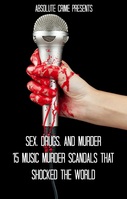Sex, Drugs, and Murder: 15 Music Murder Scandals That Shocked the World

The music industry is a multi-billion dollar industry full of drugs, sex and sometimes murder. When fast cash and easy drugs are available, some musicians spiral out of control and make enemies, while others are killed in cold blood for petty cash. Not surprisingly, the music industry has had more murder scandals than any other entertainment industry in existence.
This short book recounts 15 of the music industry's most famous murders. From Bobby Fuller to Tupac, you'll be shocked at how brutally young talent can be struck down by pointless violence.
This short book recounts 15 of the music industry's most famous murders. From Bobby Fuller to Tupac, you'll be shocked at how brutally young talent can be struck down by pointless violence.
Buy Now!
Sex, Drugs, and Murder PDF and ePub |
Excerpt
Introduction
Musical talent can lead to fame and fortune, but in many cases it has also led to a violent death. Some of the highest profile music stars in the world, including John Lennon, Selena, Notorious B.I.G., and Tupac Shakur, have been murdered.
Many people can remember where they were and what they were doing when those voices were silenced. The deaths of John Lennon and Selena led to an outpouring of grief similar to that for an assassinated political leader.
The emotions were intense because Selena and Lennon embodied the hopes and dreams of a large number of people. They were also symbols of their eras because of their influence on the popular culture. Other murdered musicians like Dimebag Darrell Abbott might not have been as famous, but their deaths were just as tragic.
There were also some musicians seemingly destroyed by the violent passions unleashed by their music. Euronymous, Tupac Shakur, and Notorious B.I.G. all embraced and promoted violence through their music, and all died violent deaths.
The deaths of Shakur and B.I.G. might have even been connected in a conspiracy that involved street gangs, organized crime, and the laundering of drug money. Their murders have never been solved.
Whether we like it or not, music and murder seem to go hand and hand. Violence, it seems, has always been part of music and can sometimes turn deadly for even the most talented musicians.
Bobby Fuller
Bobby Fuller’s murder is notable because it has never been solved nor explained. His death was tragic because the self-made rocker was on the verge of breaking out into the mainstream when his body was found in a car.
Like many rockers, Fuller is best known for one song that has become a staple, “I Fought the Law,” which regularly pops up on movie and television sound tracks. During the 1980s and 1990s the song was revived and became a punk staple; even Green Day cut a version.
Fuller never lived to see his song become part of the pop culture; instead, he was murdered shortly after recording it. The murder of Bobby Fuller is one of the big unsolved mysteries of music. It has even generated conspiracy theories about organized crime.
The Self-Made Rocker
Bobby Fuller was born in Texas and raised there and in Utah. When he was a teenager, Fuller became a huge fan of another Texas music legend: Buddy Holly. Like Fuller, Holly suffered an untimely death early in his career, his being in a plane crash that also claimed the life of Richie Valens.
Like most rockers, Fuller started out playing in garage bands but slowly turned professional. After high school, Fuller took an unusual path to fame; he built his own recording studio in his backyard and recorded his own records. A born entrepreneur, Fuller played in several bands and for a time ran his own night club to promote his career.
The big time called in 1964 when Mustang Records in Los Angeles put Fuller’s band, The Bobby Fuller Four, under contract. The deal was set up by promoter Bob Keane, who supposedly had mob connections. Keane was famous for launching Richie Valens’ career.
Fuller moved to LA and started getting songs like “Let Her Dance” on the Billboard charts. The Bobby Fuller Four also got a taste of fame on the big screen when they appeared in the B-movie The Ghost in the Invisible Bikini, which starred Nancy Sinatra and Boris Karloff. Strangely enough, in the movie, the Four lip-synced another band’s music. They were working as movie extras rather than musicians.
The Body and the Gasoline Can
By 1966 The Bobby Fuller Four had scored a big hit with “I Fought the Law” and were on the verge of breaking out. Bobby Fuller never lived to see it; instead, he made news in another way.
Fuller was found lying dead inside his car on July 18, 1966, in Los Angeles. Witnesses said he had been badly beaten and his body soaked with gasoline. A gasoline can was found inside the car, but there were no keys in the ignition.
Most witnesses believed that somebody beat Fuller to death then started preparing to set the car on fire. The murderer or murderers probably ran off when they saw bystanders coming.
The Mystery Deepens
The police and coroner’s investigation of Bobby Fuller’s death only increased the mystery. The Los Angeles County coroner first ruled that Fuller’s death was a suicide even though he had clearly been beaten. Three months later the coroner changed the cause of death to accidental asphyxiation.
The improbable explanation given by the coroner was that Fuller drowned in gasoline. Those claims and the fact that neither the car nor the gasoline can were dusted for fingerprints caused people to doubt the official story.
It is not clear why the police did not seriously investigate Fuller’s death. The lack of an investigation has led to rumors that continue to this day.
Did the Mob Kill Bobby Fuller?
The most common theory is that Bobby Fuller was murdered by gangsters who were involved in Mustang Records. Bob Keane was known to have a partner with organized crime connections.
There was also the mysterious investor in Mustang Records; this investor had taken out a large life insurance policy on Bobby Fuller and was the beneficiary. Fuller might have gotten into some sort of conflict with the gangsters that led to his death.
A possibility is that Fuller was planning to leave Mustang Records, a course of action that might have enraged gangsters. Rumor has it that Tupac Shakur was also murdered for planning to leave a record label with organized crime connections over 30 years later.
The Bobby Fuller Four’s guitarist, Jim Reese, said that he and drummer Dalton Powell left LA right after the body was discovered. They fled to El Paso because three armed men had come to their apartment looking for Bobby Fuller. When they left town, the two brought a pistol.
Or Was It Charles Manson?
Another weaker theory points to hippy cult leader Charles Manson, who was living in Los Angeles and Berkley at the time and hanging around the fringes of the music scene. It isn’t clear why Manson would have killed Fuller. It’s also certain that Manson hadn’t yet organized his murderous family in 1966.
Manson might have been connected to another theory: that Fuller injured or killed himself while experimenting with LSD, which was a popular new drug in LA in 1966. This scenario postulates that whoever was doing LSD with Fuller dumped his body in the car in an attempt to cover up the death. Those individuals might have tried to set the car on fire in an attempt to hide their involvement. Charles Manson was known to use drugs like LSD and to deal drugs. The theories involving Mason seem to be based primarily on Manson's reputation and little else.
There is no evidence backing any of these theories. Instead, the death of Bobby Fuller will remain one of the great unsolved mysteries of rock and roll.
Musical talent can lead to fame and fortune, but in many cases it has also led to a violent death. Some of the highest profile music stars in the world, including John Lennon, Selena, Notorious B.I.G., and Tupac Shakur, have been murdered.
Many people can remember where they were and what they were doing when those voices were silenced. The deaths of John Lennon and Selena led to an outpouring of grief similar to that for an assassinated political leader.
The emotions were intense because Selena and Lennon embodied the hopes and dreams of a large number of people. They were also symbols of their eras because of their influence on the popular culture. Other murdered musicians like Dimebag Darrell Abbott might not have been as famous, but their deaths were just as tragic.
There were also some musicians seemingly destroyed by the violent passions unleashed by their music. Euronymous, Tupac Shakur, and Notorious B.I.G. all embraced and promoted violence through their music, and all died violent deaths.
The deaths of Shakur and B.I.G. might have even been connected in a conspiracy that involved street gangs, organized crime, and the laundering of drug money. Their murders have never been solved.
Whether we like it or not, music and murder seem to go hand and hand. Violence, it seems, has always been part of music and can sometimes turn deadly for even the most talented musicians.
Bobby Fuller
Bobby Fuller’s murder is notable because it has never been solved nor explained. His death was tragic because the self-made rocker was on the verge of breaking out into the mainstream when his body was found in a car.
Like many rockers, Fuller is best known for one song that has become a staple, “I Fought the Law,” which regularly pops up on movie and television sound tracks. During the 1980s and 1990s the song was revived and became a punk staple; even Green Day cut a version.
Fuller never lived to see his song become part of the pop culture; instead, he was murdered shortly after recording it. The murder of Bobby Fuller is one of the big unsolved mysteries of music. It has even generated conspiracy theories about organized crime.
The Self-Made Rocker
Bobby Fuller was born in Texas and raised there and in Utah. When he was a teenager, Fuller became a huge fan of another Texas music legend: Buddy Holly. Like Fuller, Holly suffered an untimely death early in his career, his being in a plane crash that also claimed the life of Richie Valens.
Like most rockers, Fuller started out playing in garage bands but slowly turned professional. After high school, Fuller took an unusual path to fame; he built his own recording studio in his backyard and recorded his own records. A born entrepreneur, Fuller played in several bands and for a time ran his own night club to promote his career.
The big time called in 1964 when Mustang Records in Los Angeles put Fuller’s band, The Bobby Fuller Four, under contract. The deal was set up by promoter Bob Keane, who supposedly had mob connections. Keane was famous for launching Richie Valens’ career.
Fuller moved to LA and started getting songs like “Let Her Dance” on the Billboard charts. The Bobby Fuller Four also got a taste of fame on the big screen when they appeared in the B-movie The Ghost in the Invisible Bikini, which starred Nancy Sinatra and Boris Karloff. Strangely enough, in the movie, the Four lip-synced another band’s music. They were working as movie extras rather than musicians.
The Body and the Gasoline Can
By 1966 The Bobby Fuller Four had scored a big hit with “I Fought the Law” and were on the verge of breaking out. Bobby Fuller never lived to see it; instead, he made news in another way.
Fuller was found lying dead inside his car on July 18, 1966, in Los Angeles. Witnesses said he had been badly beaten and his body soaked with gasoline. A gasoline can was found inside the car, but there were no keys in the ignition.
Most witnesses believed that somebody beat Fuller to death then started preparing to set the car on fire. The murderer or murderers probably ran off when they saw bystanders coming.
The Mystery Deepens
The police and coroner’s investigation of Bobby Fuller’s death only increased the mystery. The Los Angeles County coroner first ruled that Fuller’s death was a suicide even though he had clearly been beaten. Three months later the coroner changed the cause of death to accidental asphyxiation.
The improbable explanation given by the coroner was that Fuller drowned in gasoline. Those claims and the fact that neither the car nor the gasoline can were dusted for fingerprints caused people to doubt the official story.
It is not clear why the police did not seriously investigate Fuller’s death. The lack of an investigation has led to rumors that continue to this day.
Did the Mob Kill Bobby Fuller?
The most common theory is that Bobby Fuller was murdered by gangsters who were involved in Mustang Records. Bob Keane was known to have a partner with organized crime connections.
There was also the mysterious investor in Mustang Records; this investor had taken out a large life insurance policy on Bobby Fuller and was the beneficiary. Fuller might have gotten into some sort of conflict with the gangsters that led to his death.
A possibility is that Fuller was planning to leave Mustang Records, a course of action that might have enraged gangsters. Rumor has it that Tupac Shakur was also murdered for planning to leave a record label with organized crime connections over 30 years later.
The Bobby Fuller Four’s guitarist, Jim Reese, said that he and drummer Dalton Powell left LA right after the body was discovered. They fled to El Paso because three armed men had come to their apartment looking for Bobby Fuller. When they left town, the two brought a pistol.
Or Was It Charles Manson?
Another weaker theory points to hippy cult leader Charles Manson, who was living in Los Angeles and Berkley at the time and hanging around the fringes of the music scene. It isn’t clear why Manson would have killed Fuller. It’s also certain that Manson hadn’t yet organized his murderous family in 1966.
Manson might have been connected to another theory: that Fuller injured or killed himself while experimenting with LSD, which was a popular new drug in LA in 1966. This scenario postulates that whoever was doing LSD with Fuller dumped his body in the car in an attempt to cover up the death. Those individuals might have tried to set the car on fire in an attempt to hide their involvement. Charles Manson was known to use drugs like LSD and to deal drugs. The theories involving Mason seem to be based primarily on Manson's reputation and little else.
There is no evidence backing any of these theories. Instead, the death of Bobby Fuller will remain one of the great unsolved mysteries of rock and roll.








